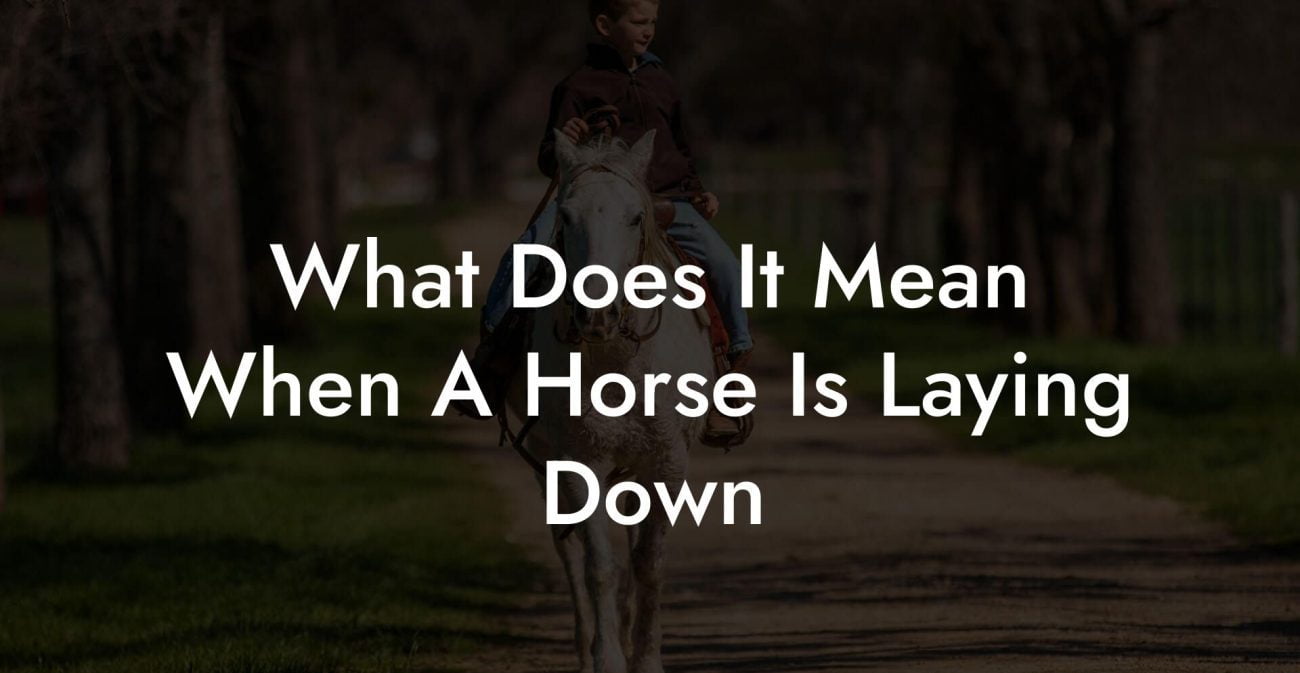Ever caught yourself scrolling through Instagram reels and wondering if your favorite mare is about to pop a foal? Well, saddle up because we’re diving into the surprisingly enthralling world of equine pregnancy! Discover how to decode those subtle (and not-so-subtle) hints revealed by a pregnant horse’s look and behavior, all while getting tips on how to care for your equine friend in a way that’s as fresh and bold as your playlist.
Quick Links to Useful Sections
- Understanding Equine Pregnancy: A Closer Look at Your Mare’s Journey
- Recognizing the Physical Changes: What to Look For in a Pregnant Mare
- Behavioral Changes and the Pregnant Horse Persona
- Veterinary Insight: The Scientific Perspective on Mare Pregnancy
- Nutritional Strategies: Feeding Your Pregnant Mare for Peak Health
- Exercise & Management: Keeping Your Mare Active and Comfortable
- Holistic and Integrative Approaches: Beyond the Basics of Equine Care
- Common Myths and Misconceptions About Pregnant Horses
- Observing the Timeline: Phases of Equine Pregnancy
- Modern Tools and Technology in Equine Prenatal Care
- Resources and Community Support: Your Next Steps
- Crafting Your Personalized Equine Prenatal Care Plan
- 1. Consult with a Veterinarian and Equine Nutritionist
- 2. Monitor Behavioral and Physical Changes
- 3. Integrate Traditional and Holistic Practices
- 4. Adapt Your Feeding and Exercise Routine
- 5. Embrace Technology to Stay Informed
- FAQ: Your Questions About Pregnant Horses Answered
- Your Journey to a Radiant, Happy Pregnant Mare
Understanding Equine Pregnancy: A Closer Look at Your Mare’s Journey
Equine pregnancy isn’t just about a bigger belly, it’s a transformative journey that involves changes to the mare’s body, behavior, and even her nutritional needs. Much like how your favorite influencer evolves over time, a pregnant horse undergoes gradual, yet fascinating changes that signal the miracle unfolding beneath her coat. For those of you who love all things holistic and natural (and who enjoy spotting the tiny details in everyday life), understanding these signs can be both an art and a science.
From a veterinarian’s perspective, a mare’s gestation lasts about 11 months, during which subtle shifts occur week by week. Knowing what to look for not only enhances your bond with your equine companion but also helps ensure that she receives the best care possible. Whether you’re new to horse ownership or you’re a seasoned rider with a quirky love for all things Instagrammable, this guide is your one-stop resource for decoding the mystery of what a pregnant horse really looks like.
Keywords like “pregnant horse,” “mare pregnancy signs,” “equine prenatal care,” and “horse care tips” aren’t just buzzwords, they’re the core of a new breed of equine enthusiasts who want to blend traditional care with a modern, Gen-Z spin.
Recognizing the Physical Changes: What to Look For in a Pregnant Mare
Observing a pregnant horse is a bit like tracking the latest fashion trends, there are subtle shifts in style that, once you know what to look for, become unmistakable. One of the most obvious signs of pregnancy is the gradual increase in belly size. However, unlike a supermodel’s runway reveal, this transformation happens in stages, each carrying clues about the mare’s stage of pregnancy.
In the early weeks, you might notice a minor swelling of the lower abdomen and a slightly rounded look that hints at impending foalhood. As the pregnancy advances, the mare’s belly becomes more prominent, often accompanied by visible changes in her posture. Her back might appear lower, and the distribution of her weight will shift as the foal grows.
Additionally, many pregnant mares exhibit a softening of the udder and subtle variations in skin texture. These changes are the body’s way of gearing up for lactation. Keep an eye out for a fuller, more pronounced udder near the latter stages of pregnancy, a clear indication that milking and nurturing will soon be on the agenda.
Whether you’re snapping candid photos for your feed or simply admiring your mare during early morning paddocks, recognizing these physical signs will help you track the progress of her pregnancy. And remember, every mare is as unique as your favorite quirky TikTok creator, so while these changes are common, variations always exist.
Behavioral Changes and the Pregnant Horse Persona
Just as people undergo mood shifts during big life events, pregnant mares also experience behavioral alterations. One minute they’re the life of the paddock, and the next, they’re calmly grazing in a more introspective mode. These changes are not only natural, they’re a vital part of how the mare conserves energy for her baby.
Some mares can become more affectionate, seeking extra attention from their human buddies. Others might display a bit of moodiness, preferring quiet time over playful interactions. It’s a bit like watching an emotional indie film that slowly reveals its secrets: sometimes heartwarming, sometimes mysterious, but always compelling.
Another common behavioral change is an increased interest in her surroundings. You might notice that your pregnant mare becomes unusually curious about her environment, sniffing more, exploring different areas of the stable, and even showing a slight reluctance to join the herd if she’s feeling particularly vulnerable.
Recognizing these shifts can help you adjust her care routine accordingly. What may seem like a quirky personality trait could actually be a signal that she’s conserving energy or responding to hormonal changes. Maintaining a calm, stress-free environment is crucial during this period, and sometimes a bit of extra TLC is all she needs to stay in tip-top shape.
Veterinary Insight: The Scientific Perspective on Mare Pregnancy
While we love to keep things relatable and humorous, there’s no substitute for scientific insight when it comes to understanding how a mare’s body adapts during pregnancy. Veterinarians often use advanced tools like ultrasound scans, blood tests, and careful physical examinations to monitor the progress of a foal on the way.
Ultrasounds, for instance, are like the “behind the scenes” look at a pregnant horse’s life. They offer an inside view of the developing foal, verifying health and progress at different stages of gestation. This technology is not only reassuring for owners but can also pinpoint key moments in the pregnancy timeline, much like your favorite YouTuber drops unexpected content on a whim.
Blood tests can help monitor hormone levels, ensuring that the mare’s body is progressing as expected. By checking vital markers such as progesterone, veterinarians can gauge the health of the pregnancy and catch potential complications early. Regular vet check-ups are a critical component of equine prenatal care, blending technology with deep expertise.
The combination of technological advances and traditional wisdom ensures that both you and your mare feel confident throughout the journey. After all, when it comes to your four-legged friend, safety and well-being are always in style.
Nutritional Strategies: Feeding Your Pregnant Mare for Peak Health
Just like your favorite plant-based smoothie or a balanced avocado toast, the diet you provide for your pregnant mare can have a lasting impact on her energy levels and overall health. Equine nutrition is an art form when it comes to prenatal care, combining high-quality forage, special concentrates, and the right amount of supplements to meet elevated energy demands.
In early pregnancy, a balanced diet rich in essential vitamins and minerals supports both the mare and the developing foal. As the pregnancy progresses, her nutritional needs might change, she might require additional calories and protein to help with the demands of gestation. Think of it as upgrading from a basic meal plan to an all-inclusive gourmet dining experience for two.
Key dietary ingredients should include:
- Forage and hay: The foundation of any equine diet, providing vital fiber and nutrients.
- Energy concentrates: Grains or specially formulated feeds that ensure the mare gets adequate calories.
- Supplemental minerals and vitamins: These help boost her immune system and support healthy foal development.
- Clean water: Hydration is absolutely crucial, as it aids digestion and overall metabolism.
Tailor your mare’s feeding schedule around her pregnancy milestones by consulting with your equine nutritionist or veterinarian. After all, a well-fed mare is not only a happy mare but also paves the way for a strong, healthy foal.
It’s all about balance, just as you might mix a dab of nut butter into your morning smoothie, blending traditional feed with modern supplements can create a recipe for success that supports your mare throughout her pregnancy.
Exercise & Management: Keeping Your Mare Active and Comfortable
While you might think that a pregnant horse deserves a full day of rest like a celebrity on a weekend getaway, moderate exercise is essential to keep her muscles engaged and her joints flexible. The trick is to find the sweet spot between activity and relaxation.
Light exercise, such as gentle turnout in a spacious paddock or controlled hand-walking, ensures that the mare continues to stay fit without overtaxing her body. This is especially important as the foal begins to develop, maintaining circulation and muscle tone can make all the difference down the line.
Additionally, proper stable management plays a critical role in prenatal care. Keeping her stall clean, ensuring ample comfortable bedding, and providing a stress-free environment can reduce the risk of complications like colic or laminitis, a concern that every responsible owner keeps top of mind.
Think of it like planning a chill day at your favorite coworking café, where every detail is curated to promote well-being. A quiet, comfortable space with minimal disruptions allows your pregnant mare to relax and conserve precious energy for the miraculous process of nurturing new life.
Holistic and Integrative Approaches: Beyond the Basics of Equine Care
In today’s fast-paced, always-connected lifestyle, holistic horse care is gaining traction among Gen-Z and millennial horse owners. These modern caretakers lean into integrative practices that complement conventional veterinary care. Whether it’s through specialized massage techniques, acupuncture sessions, or even mindfulness practices designed for horses, there’s a growing recognition that your mare’s emotional well-being is just as important as her physical health.
For instance, regular grooming can be transformed into a meditative bonding ritual between you and your horse. A gentle massage along her neck and shoulders not only relaxes tense muscles but also deepens your trust and communication, a win-win for both of you.
Acupuncture, though it might sound like something out of an ancient scroll, has modern applications in equine health. By targeting specific pressure points, acupuncture can help alleviate muscle tension and improve overall circulation, which is especially beneficial during the later stages of pregnancy.
These integrative therapies add an extra layer of depth to the standard practices of equine prenatal care. They embrace the idea that nurturing your mare’s well-being extends beyond routine check-ups and balanced diets, it's about fostering a holistic environment where both body and soul can thrive.
Common Myths and Misconceptions About Pregnant Horses
If you’ve ever scrolled through a horse lover’s forum late at night, you may have come across a slew of myths about what a pregnant horse does or doesn’t do. Let’s debunk a few of these so you can confidently navigate your mare’s pregnancy journey with a healthy dose of skepticism and science.
Myth #1: “A pregnant mare always stands apart from the herd.”
Reality: While some mares may exhibit a bit more caution, many pregnant horses still enjoy the company of their herd. Changes in behavior are personal and can vary widely, so don’t be surprised if your mare remains the life of the paddock.
Myth #2: “Only a visible, dramatically swollen belly means she’s pregnant.”
Reality: Especially in the early stages, a pregnant mare’s changes can be subtle. A slight softening of the udder, a change in gait, or even behavioral shifts can all be clues that her foal is on the way. The full picture unfolds gradually.
Myth #3: “Pregnancy always compromises a mare’s performance.”
Reality: With proper care, nutrition, and management, a pregnant mare can continue to be active and engaged. While caution is key, many mares maintain their usual pace and energy levels throughout much of their pregnancy.
Summing it up, stay curious and question established norms. The more informed you are, the better you can care for your horse with modern, sensible, and even a touch of playful insight.
Observing the Timeline: Phases of Equine Pregnancy
A pregnant mare’s journey is typically divided into three main phases: early, mid, and late pregnancy. Each phase has its own set of characteristics and care requirements.
Early Pregnancy (Weeks 1-4):
During the initial weeks, changes might be nearly imperceptible. It’s the time for vital ultrasound scans and blood tests, which provide the early confirmation of pregnancy. While outward signs are minimal, a slight change in her appetite or behavior might be noticeable to those who know her best.
Mid-Pregnancy (Weeks 5-8):
In this phase, the foal is growing steadily, and you may begin to notice that subtle swelling of the lower abdomen evolves into a more defined, rounded profile. Tasteful adjustments in nutrition and exercise start taking shape as the mare’s needs become more pronounced. Owners who keep track of these changes often report noticing increased tenderness in her neck and shoulders during grooming sessions, a sign that extra care is needed.
Late Pregnancy (Weeks 9-11):
As the due date approaches, the mare’s physical changes become unmistakably clear. Her belly grows even fuller, the udder becomes more prominent and ready to produce milk, and she might display noticeable behavioral shifts such as increased calmness or, conversely, agitation when disturbed. This phase is all about preparation, both physically and emotionally, for the arrival of the foal.
Understanding these phases empowers you as a caregiver. It enables you to tailor her environment, adjust routines, and even communicate more effectively with your veterinarian. It’s like knowing the drop dates for your favorite music album, you’re always one step ahead!
Modern Tools and Technology in Equine Prenatal Care
In our connected, tech-savvy age, equine care isn’t left behind. Numerous modern tools have popped up to help you keep track of every milestone in your mare’s pregnancy journey. From mobile apps that log feeding times and exercise routines to wearable trackers that monitor vital signs and activity levels, technology has become an indispensable ally in equine prenatal care.
These innovations allow you to seamlessly combine traditional wisdom with real-time data, ensuring that your mare’s health is always prioritized. Imagine having a dashboard that not only keeps tabs on her nutrition, exercise, and behavior, but also offers timely reminders for veterinary visits. It’s like having a personal trainer, nutritionist, and health coach, only for your horse.
With tools like ultrasound imaging devices connected to cloud systems and equine-specific health apps, you now have all the information necessary to make informed decisions on the go. This new era of digital horse care is designed for the modern owner, blending tech innovation with the warmth and authenticity of hands-on care.
Resources and Community Support: Your Next Steps
You don’t have to navigate the twists and turns of equine pregnancy all by yourself. Today’s equine community is vibrant, accessible, and full of resources tailored to your unique needs as a modern horse owner. Online forums, social media groups, and even specialized apps provide platforms where you can share your experiences, ask for advice, and celebrate the little victories along the way.
Look into joining local equine clubs or online communities that focus on prenatal care for horses. These networks are treasure troves of practical tips, success stories, and even humorous anecdotes that remind us all that while horse care is serious business, it’s also about enjoying the ride.
Whether you’re learning about the subtle art of grooming your pregnant mare or exploring innovative feeding strategies, tapping into these resources will enhance your overall experience. And in a world that’s as connected as ever, sharing insights and asking questions has never been easier, or more fun!
Let your journey into holistic equine care inspire you to experiment and trust your instincts while remaining informed by expert advice. Your mare is counting on you, and with the right community support, every step of her pregnancy becomes a shared celebration.
Crafting Your Personalized Equine Prenatal Care Plan
Just as every playlist is unique, every mare deserves a personalized care plan that suits her individual needs. Here are some key steps to designing a comprehensive plan:
1. Consult with a Veterinarian and Equine Nutritionist
Your first stop should be a comprehensive health check. A qualified veterinarian will perform an initial assessment using ultrasound scans and hormonal blood tests while an equine nutritionist can help map out the perfect diet. This dual approach ensures your mare’s health is supported both physically and nutritionally.
2. Monitor Behavioral and Physical Changes
Keep a daily log of your mare’s eating habits, exercise patterns, mood, and any physical changes. This journal will serve as your personal “equine diary,” helping you track everything from slight increases in belly size to changes in her grooming patterns, ensuring you catch any early signals that might need extra attention.
3. Integrate Traditional and Holistic Practices
Blend conventional veterinary care with holistic practices like gentle massage, acupuncture sessions, or even mindfulness-based relaxation techniques for your horse. Incorporating both forms of care creates a dynamic plan that addresses her overall well-being.
4. Adapt Your Feeding and Exercise Routine
As your mare’s pregnancy progresses, her nutritional and exercise needs will evolve. Regularly update her diet plan to include high-quality forage, necessary supplements, and controlled exercise schedules that prevent overexertion while maintaining muscle tone.
5. Embrace Technology to Stay Informed
Leverage modern apps and wearable technology to monitor her vital signs and daily activity. These tools help you stay informed in real time, making it easier to adapt her care plan as needed.
By following these five simple steps, you create a care plan that marries science with heart, a balanced approach that ensures your mare is healthy, happy, and ready for her foal’s arrival.
FAQ: Your Questions About Pregnant Horses Answered
We’ve rounded up the most frequently asked questions from horse owners just like you. Whether you’re a newbie or a seasoned equine enthusiast, these answers are designed to help you navigate the world of mare pregnancy with confidence.
1. What are the earliest signs of pregnancy in a mare?
Early signs can be very subtle and may include a slight change in behavior, minor swelling in the lower abdomen, and initial changes in the udder. An ultrasound or blood test is often required for a confirmation.
2. How soon can I detect pregnancy in my horse?
Generally, a veterinarian can detect pregnancy as early as 14 to 21 days post-breeding using ultrasound. Blood tests conducted a few weeks later can also confirm the pregnancy by measuring hormone levels.
3. Are there any special nutritional requirements for a pregnant mare?
Yes, pregnant mares require a balanced diet that includes quality forage, energy-rich concentrates, and appropriate supplements such as vitamins and minerals. Adjustments in the diet should be made as the pregnancy progresses.
4. How much exercise is safe for a pregnant horse?
Moderate, low-impact exercise is recommended. For example, gentle turnout and controlled walks are great, but you should avoid overly strenuous workouts. Tailor her exercise routine to her comfort and stage of pregnancy.
5. What are some common myths about mare pregnancy?
One myth is that a pregnant mare must isolate herself from the herd. In reality, many mares continue to enjoy the social dynamics of group living. Another common misconception is that only a visibly swollen belly indicates pregnancy; in the early stages, signs can be very subtle.
6. Can modern technology help monitor my mare’s pregnancy?
Absolutely. With apps and wearable trackers designed for horses, you can monitor her activity levels, vital signs, and overall health, ensuring that any concerns are addressed promptly.
7. How can I tell if my mare is stressed during pregnancy?
Signs of stress include changes in eating habits, erratic behavior, and possibly a reluctance to interact with other horses. Ensuring a calm and supportive environment can help alleviate these stressors.
8. When should I schedule veterinary check-ups during pregnancy?
Regular check-ups are recommended throughout the pregnancy. Veterinary visits are often scheduled at key intervals, early, mid, and late pregnancy, to monitor her health and the foal’s development.
Staying informed and proactive about your mare’s prenatal care can make all the difference. After all, knowledge is power, and in this case, it’s the secret to a happy, healthy pregnancy.
Your Journey to a Radiant, Happy Pregnant Mare
Every mare is a marvel of nature, and watching her journey through pregnancy can be as inspiring as following a transformative vlog series. With the right mix of scientific care, holistic approaches, and a pinch of modern tech, you’re all set to provide a nurturing environment that ensures she not only survives but thrives.
From observing subtle bodily cues to embracing modern strategies for equine prenatal care, each moment in your mare’s pregnancy is a reminder of the beauty and complexity of life. Cherish the little details, the softened udder, the gentle behavior changes, the way she seems to glow when she’s near you.
As you continue to journey into the world of holistic equine care, remember that every small act of care, every thoughtful adjustment, and every shared moment strengthens the bond between you and your mare. It’s about celebrating her unique journey toward motherhood and acknowledging that, just like the best social media moments, each milestone is worth savoring.
Embrace the adventure, with science, humor, and heart, your mare’s journey to a radiant, healthy pregnancy is a story that’s waiting to be told. And as you document every step on your blog or social feed, you’ll not only be the champion of her care but also a beacon of modern, empowered equine stewardship.













